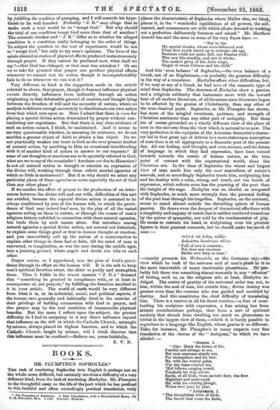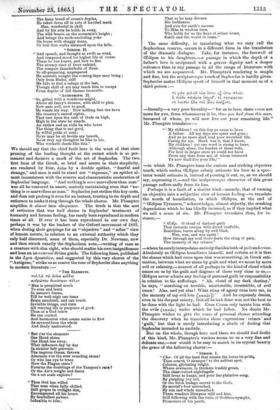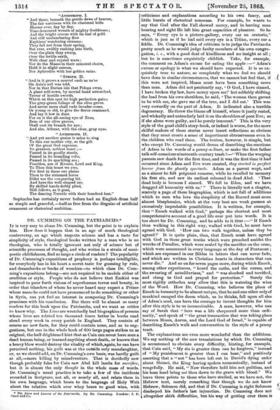BOOKS.
MR. PLUMPTRE'S SOPHOCLES.*
Tux task of rendering Sophocles into English is perhaps not on the whole more difficult, but certainly involves a difficulty of a very different kind, from the task of rendering /Eschylus. Mr. Plumptre in the thoughtful essay on the life of the poet which he has prefixed to this faithful and often exceedingly poetical translation, truly • The Tragedies of Sopliocles. A New Translation, with a Biographical Essay. By E. H. Plumptre, M.A. 2 vols. London: Strahan,
places the characteristic of Sophocles where Muller also, we think, places it, in the " wonderful equilibrium of all powers, the self- control, and consummate art with which all are devoted to working out a perfection deliberately foreseen and aimed." Mr. Matthew Arnold has said the same in some of his very finest lines :-
" But be his
My special thanks, whose even-balanced soul From first youth tested np to extreme old age, Business could not make dull, nor Passion wild ; Who saw life steadily, and saw it whole ; The mellow glory of the Attic stage, Singer of sweet Colons and his child."
And this even balance' of Sophocles,—the even balance of a Greek, not of an Englishman,—is probably the greatest difficulty in the way of a translator. 2Eschylus offers other difficulties, but, if we may so say of a Greek, he had more of the romantic type of mind than Sophocles. The choruses of 2Eschylus show a passion and a religious sublimity that harmonize more with the inward bent of all modern literature, of all literature since literature began to be affected by the genius of Christianity, than any other of the true classical poets. Sophocles, as Mr. Plumptre has shown, has more of the mingled sweetness, patience, and strength of Christian sentiment than any other poet of antiquity. But these are of course grounded on a wholly different view of the place of man in the universe from the view which is natural to us now. The very perfection in the equipoise of the Athenian dramatist's charac- ter led in that great age of Athens to a more statuesque conception of man than is at all appropriate to a dramatic poet of the present day. All our feeling, and thought, and even science, and the forms of language in which they find expression, have been turned inwards towards the centre of human nature, as the true point of contact with the supernatural world, since the Christian era. In the time of Sophocles the wisest and largest view of man made him only the most marvellous of nature's marvels, and so accordingly Sophocles treats him, sculpturing him and his destiny with a calm, strong, sad touch, not too lavish of expression, which reflects even less the yearning of the poet than the insight of the sage. .schylus was an idealist as compared with Sophocles, so much more strongly does the personal feeling of the poet beat through his tragedies. Sophocles, on the contrary, seems to stand almost outside the disturbing sphere of human passion. He draws even the deepest of the natural affections with a simplicity and majesty of touch that is neither rendered tremulous by the quiver of sympathy, nor cold by the condescension of pity. He seems to restrain his hand, in sculpturing even his greatest
figures in their greatest moments, lest he should make too much of man :—
iroJa.S. ret SOW, xotiotu &Apo,' rou thip6rEpoy lriXzi- " Full of awe is creation; Nor does any creature Strike awe deep as man," - —exactly presents his Weltansicht, as the Germans say,----the view which he took of the universe and of man's pld64 in it as the most inscrutable of many inscrutable phenthiiena. Halsro- bably felt there was something almost womahly in any" effusios" of feeling, such as, on the religious side at least, .tEschylus in- dulged. The centre of gravity of the universal order was not, to him, within the soul of man, but outside him divine destiny was greater even than the creature who was guided and moulded by destiny. And this constitutes the chief difficulty of translating him. There is a reserve in all his finest touches,—a fear of over- loading his sculpture with expression, a fear arising less from artistic considerations perhaps, than from a sort of spiritual modesty that shrank from dwelling too much on phenomena so trivial in the largest view of them,--which it is barely possible to reproduce in a language like English, whose genius is so different. Take, for instance, Mr. Plumptre's in many respects very fine translation of the chorus of the "Antigone," to which we have alluded :—
" STROPH. L
" Chor. Many the forms of life,
Fearful and strange to see, But man supreme stands ant, For strangeness and for fear.
He, with the wintry gales, O'er the foam-crested sea, 'Mid billows surging round, Tracketh his way across. Earth, of all Gods, from ancient days, the first Mightiest and undecayed.
He, with his circling plough, Wears ever year by year.
" Airrarraora. I.
"The thoughtless tribe of birds, The beasts that roam the fields, The finny brood of ocean's depths, He takes them all in nets of knotted mesh
Ms", wonderful in skill.
And by his arts he holds in sway, The wild beasts on the mountain's height; And brings the neck-encircling yoke On horse with shaggy mane, Or bull that walks untamed upon the hills.
" &norm II.
" And speech, and thought as swift as wind, And tempered mood for higher life of states, These he has learnt, and how to flee The stormy sleet of frost unkind, The tempest thunderbolts of Zeus. So all-preparing, unprepared He meeteth nought the coming days may bring ; Only from Hades, still He fails to find a refuge at the last, Though skill of art may teach him to escape From depths of fell disease incurable.
"Asannitorm "So, gifted with a wondrous might, Above all fancy's dreams, with skill to plan, Now unto evil, now to good, He wends his way. Now holding fast the laws His country's sacred rights, That rest upon the oath of Gods on high, High in the state he stands. An outlaw and an exile he who loves The thing that is not good, In wilful pride of soul : Ne'er may he sit beside my hearth, Ne'er may my thoughts be like to his, Who worketh deeds like this."
We should say that the chief fault here is the want of that close prdning of the leading thought at the outset which is so per- manent and decisive a mark of the art of Sophocles. The two first lines of the Greek, so brief and severe in their simplicity, are rendered by four, ata,a, by a double epithet, "fearful and strange," and man is said to stand out " supreme," an epithet al- most inconsistent with the reserve and characteristic moderation of Sophocles' language. "And nothing is more marvellous than man" was all he ventured to assert, scarcely maintaining even that "no- thing is so marvellous as man." Sophoclea just strikes this key-note, and does not prolong it even for an instant, trusting to its depth and reticence to make it ring through the whole chorus. Mr. Plumptre amplifies it almost into eloquence. The truth is that the sort of reticence that was half shame in Sophocles' treatment of humanity and human feeling, has rarely been reproduced in modern times at all. If ever it has been reproduced in our own day, perhaps it was by the leaders of the Oxford movement of 1833, when during their gropings for an " objective " and "sober" view of human nature, in relation to an external authority which they only half discerned, some of them, especially Dr. Newman, now and then struck exactly the Sophoclean note,—writing of man as a creature with dim sight, who should realize his own insignificance and lean on an external divine guide. The following lines, published in the Lyra Apostolica, and suggested by this very chorus of the " Antigone," strike us as nearer the tone of Sophocles than anything in modern literature
" Tins Fasimarrs.
woMs.ce yet 3EXa tcoDdsw
ecveparrou Ben■orepow "Man is permitted much To scan and learn In nature's frame, Till he well-nigh can tame Brute mischiefs, and can touch Invisible things, and turn All waning ills to purposes of good. Thus as a God below He can control And harmonize what seems amiss to flow As severed from the whole And dimly understood.
"But o'er the elements One Hand alone, One Hand has sway. What influence day by day In straiter belt prevents The impious Ocean, thrown Alternate o'er the ever sounding shore? Or who has eye to trace How the Plague came ? , • Forerun the donblings of the Tempest's race ? Or the Air's weight and flame On a set scale explore ?
" Thus God has willed That man when fully skilled, Still gropes in twilight dim, Encompassed all his hours By fearfullest powers Inflexible to him; That so he may discern His feebleness And e'en for earth's success To Him in wisdom turn, Who holds for us the keys of either home, Earth and the world to come."
The same difficulty, in translating what we may call the Sophoclean reserve, occurs in a different form in the translation of the dramatic dialogue. Take, for instance, the farewell of CEdipus to his daughters,—a passage in which the depth of a father's love is sculptured with a graver dignity and a deeper reticence than in any passage in all the range of literature with which we are acquainted. Mr. Plumptre's rendering is simple and fine, but the sculpturesque touch of Sophocles is hardly given. Sophocles makes (Edipus speak of himself in that moment as of a third person
rii yap coiXsii, oux /my E;, orou ■3•Xtol, rons rav8p65 ;trzstP , a s-Irroig,svat rb X.oiltiv on 7.0i; §iou diciEsrE.
—literally—a very poor literality—" for as to love, there exists not more for you, from whomsoever it be, than you had from this man, bereaved of whom, ye will now live out your remaining life." Mr. Plumptre translates :-
"' My children ! on this day ye cease to have A father. All my days are spent and gone ; And ye no more shall lead your vrretahod life, Caring for me. Hard was it, that I know, My children ! yet one word is strong to loose, Although alone, the burden of these toils, For love in larger store ye could not have From any than from me, of whom bereaved Ye now shall live your life,'" —in which Mr. Plumptre loses the curious and striking objective touch, which makes (Edipus calmly estimate his love as a spec- tator would estimate it, instead of pouring it out, or, as we should say, expressing it,—and the sculpturesque character of this great passage suffers sadly from its loss.
Perhaps it is a fault of a similar kind—namely, that of turning an objective into a subjective view of human feeling—to translate the words of humiliation, in which Gldipus, at the end of " CEdipus Tyrannus," acknowledges, almost abjectly, the crushing degradation which he has blindly incurred, as if they implied what we call a sense of sin. Mr. Plumptre translates thus, for in- stance,- " CEdip. 0 cloud of darkest guilt
That onwards sweeps with dread ineffable, Resistless, borne along by evil blast, Woe, woe, and woe again ! How through my soul there darts the sting of pain, The memory of my crimes,"
—where he surelyinterpolates entirely the idea both of guilt and crime. Absolutely as (Edipus humiliates himself, and certain as it is that the shame which had come upon him was something, in Greek esti- mation, between what we mean by guilt and what we mean by mere evil or calamity,—nearest of all perhaps to the kind of cloud which comes on us by the guilt and disgrace of those very close to us,— CEdipus never admits any feeling of personal guilt or responsibility in relation to his sufferings. " Ah, cloud of my dark destiny," he says, " marching on terrible, unutterable, irresistible, of evil omen ! Alas, and yet alas ! What sting of agony runs into me, in the memory of my evil lots [zaxiodl" And he expressly denies, even in his deepest misery, that all he had done was not the best to be done with the light he had. Even Creon only taunts him with the evils (xaxidv) under which he had fallen. No doubt Mr. Plumptre wishes to give the sense of personal shame attending the discovery when he translates these expressions crimes' and guilt,' but that is surely introducing a shade of feeling that
Sophoclee intended to exclude.
But on the whole, though here and there we should find faults
of this kind, Mr. Plumptre's version seems to us a very fine and delicate one,—nor would it be easy to match in its crystal beauty the grace of the following chorus :— " STROPH. I.
"Cher. Of all the land that counts the horse its pride,
Thou com'st, 0 stranger! to the noblest spot,
Colonus, glistening bright.
Where evermore, in thickets freshly green, - The clear-voiced nightingale Still loves to haunt, and pour her plaintive song, BY Purl:ding ivy hid, Or the thick leafage sacred to the Gods, By mortal's foot untouched, By sun and winds unscathed. There wanders Dionysos wild and free, Still following with the train of Goddess-nymphs, Protectors of his youth.
"Ammon!. L "And there, beneath the gentle dews of heaven, The fair narcissus with its clustered bells Blooms ever, day by day, Time-honoured wreath of mighty Goddesses ; And the bright crocus with its leaf of gold.
And still nnslumbering flow Kephisus' wandering streams ; They fail not from their spring, But ever, swiftly rushing into birth, Over the plain they sweep, Over the fertile earth, With clear and crystal wave : Nor do the Muses in their minstrel choirs, Hold it in alight esteem, Nor Aphrodite with her golden reins.
"S'raorn. II.
"And in it grows a marvel such as ne'er On Asia's soil was told, Nor in that Dorian isle that Pelops owns, A plant self-sown, by mortal hand untouched, Terror of hostile swords, Which on this spot its high perfection gains, The grey-green foliage of the olive grove.
And never more shall rude invader come, Or young or old, to give the fierce command, And lay it low in dust.
For on it the all-seeing eye of Zeus, Zeus of our olive groves, Shall cast its branch for aye ; And she, Athene, with the clear, gray eyes.
" AuTurrnoni. II.
"And yet another praise is mine to sing To this our mother city, as the gift Of the great God supreme, Its greatest, noblest boast • —
Famed in its goodly steeds,
Famed in its bounding colts, Famed in its sparkling sea ; Poseidon, son of Krona, Lord and King, To Thee this boast we owe, For first in these our plains Thou to the untamed horse Didst use the conquering bit.
And here the well-shaped oar, By skilled hands deftly plied, Still follows, as it goes, The dancing Nereids with their hundred feet."
Sophocles has certainly never before had an English dress half as simple and graceful, —half so free from the disguise of artificial ornament or rhetorical ambition.
































 Previous page
Previous page